THE ACCOUNTANT
SCAN CODE FOR DIGITAL MAGAZINE



SCAN CODE FOR DIGITAL MAGAZINE


THE ACCOUNTANT magazine is issued quarterly.
Published by EDITOR
Maria Cauchi Delia DESIGN
Daniela Cutajar
ADVERTISING INQUIRIES
theaccountant@miamalta.org
All correspondence, articles for publication and enquiries are to be addressed to:
The Editor MIA Professional Limited Level 1, Tower Business Centre Tower Street, Swatar BKR 4013, Malta.
The Institute does not necessarily concur with the views expressed by the authors in the articles published in this journal. The publishers and authors do not assume any responsibility for loss or damages incurred by any person acting or refraining from action as a result of any view expressed in this journal.
If you would like to be featured in this publication, please visit www.bit.ly/GetRecognised for more information.
4
The
The socio-economic and environmental realities that define who we are and how we interact with each other have changed drastically over a mere decade. Transformation has been complex, populations have aged and become more diverse, ecosystems are under more stress and resources – whether human or natural – have never been this scarce.
Given the interconnectedness of the globalised world of today, no country is immune to such developments. Yet this stream of change opens opportunities. Change must not be perceived as a threat, but rather as a new blank chapter in which we can create the future that we aspire to see. Indeed, Malta’s future success depends precisely on our ability to respond and adapt to the developments that are taking place around us.
Taking a leaf out of a very insightful contribution to this publication by the esteemed economist Dr Gordon Cordina, the continuation of economic growth requires the Maltese economy to re-invent itself periodically to meet impending challenges and opportunities. This cannot be achieved haphazardly, but only if all relevant stakeholders, whether in government, regulatory bodies and institutions, the private sector and professional bodies get together to devise a well-defined path which identifies not only the final objectives but also the tools and resources required to get there while addressing the possible pitfalls and bottlenecks which obstruct the successful achievement of such plans. It will also happen if we accept that economic, social and environmental objectives are not diametrically opposed: to the contrary, one can re-enforce the other.
As economies reboot in post-pandemic mode, it is imperative that the Maltese economy continues to move towards high-value avenues of growth, ones which are more tech-based and less human-
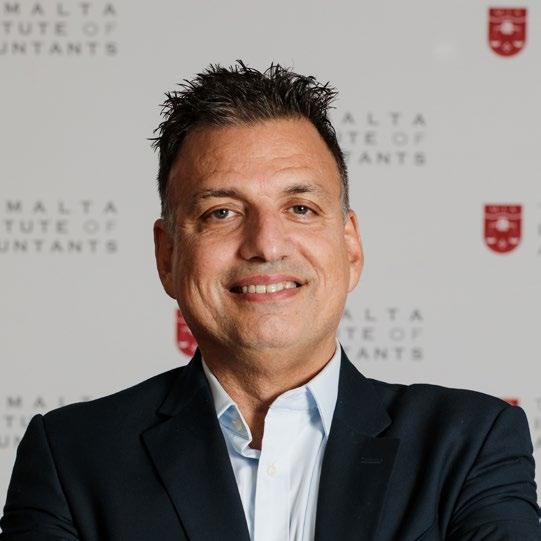
resource hungry. We have to find new niches, which are innovative, provide substance and in which we can truly elevate our jurisdiction into a centre of excellence.
The financial services sector is no exception to this. Given its significant role in the Maltese economic landscape, this duty takes on even greater importance. A recent study has found that the wider export-oriented services sector accounts for just under 20% of the Gross Value Added (GVA) generated in the total economy, and employed over 22,000 employees, such that its level of employment represents 10% of the total workforce in the Maltese economy.
Businesses operating in these fields invest to increase economic value added to the Maltese economy and produce high-quality jobs, paving the way for the introduction of new technologies, higher quality employment and a multiplier effect on other economic niches such as retail and tourism.
In this context, the Malta Institute of Accountants is proud to be among the founding institutions to participate in the setting up of the Malta Financial Services Advisory Council (the Council), created specifically to draw-up a longer-term strategic plan for the industry, coupled with proposals for regulatory and legislative innovations, the development of skills and the promotion of our jurisdiction among international markets.
The key objectives identified by the Council resonate closely with those which the Institute has long called for: the identification of opportunity areas where Malta can establish itself in providing unique services with a competitive advantage, while addressing existing bottlenecks. The latter can include administrative bureaucracy, judicial limitations, challenges related to the opening of bank accounts and the lack of qualified personnel. It is
certainly an honour for the industry that Mr Joseph Zammit Tabona has accepted to lead this Council given the wide experience he brings to the table. As an Institute, we are moreover grateful that he accepted to share some insights into the early work of the Council for this edition of The Accountant.
We genuinely believe that the strategy launched by the Council will witness the start of a new era for our financial services industry, one in which we strive harder to put aside the clouds which had gathered in previous years and cement our place as one of the most reputable jurisdictions on the continent. Given the importance we are giving to this strategy, it was a natural decision for the MIA that this year’s Biennial Conference, one of the most important events on our calendar, would be dedicated to this subject.

Indeed, the Biennial, being held on the 31st May 2023, will offer participants with an exclusive
opportunity to receive first-hand insight on the newly-developed financial services strategy, drawn up by the Malta Financial Services Advisory Council. I genuinely look forward to see our members present in strong numbers for this event given that the presence of high-level players that have worked on the different facets of this strategy, will offer unique insight and awareness that will allow professionals to strengthen and facilitate their role within their organisations in the years ahead.
This is a not a strategy which is good to have, but one which will make or break our future. And for it to succeed, it must be owned by each and every one of us.
It is our collective responsibility to make it happen.
 Maria Cauchi Delia
Maria Cauchi Delia
A warm welcome to the first edition of the year of The Accountant.
I am confident that you will find this edition very engaging. It takes on many of the issues that the profession faces in carrying out its duties, with the people who matter being asked the questions that you have been asking. Indeed, I would like to thank all the contributors for taking time off their busy schedules to share their views and answer our questions, adding quality and value to our flagship publication.
Earlier this year, I had the opportunity to represent the Institute at the Chief Executives’ Forum of the International Federation of Accountants (IFAC). Besides serving as an excellent opportunity to share knowledge and best practice and to learn from the experience of representatives of our counterparts, what struck me was the similarity of the challenges that are faced by the profession in widespread areas of the globe. Regulatory changes, difficulties in attracting and retaining talent and the impact of sustainability reforms were some of the matters discussed.
I must admit having felt a sense of pride but more importantly a sense of comfort that the Malta Institute of Accountants (MIA) has long been raising awareness on these issues, hosting debates, consultations, training programmes and alerting its membership base on the key changes ahead. Although this does not take the challenges away, being prepared gives all of us a first-mover advantage.
We have been forward-looking on all these issues and we continue to engage with the relevant stakeholders representing the position of our profession.
One of the aspects that the Institute is working on is in relation to regulatory and tax reform. Increased regulation, and the associated disclosure rules, will continue to impact the accountancy profession for years to come. As the world reels from a series of international high-profile scandals, from the Panama Papers to the Swiss Leaks, multilateral efforts to address tax avoidance, tax base erosion, profit-shifting and even money-laundering have accelerated and are a new reality. Added to this, the effect of the pandemic and then the war on our continent heightened the attention on tax contributions. While the European Union has closed an eye on countries who missed on their debt and deficit targets over the past couple of years, it has now announced that by 2024 it is time to put the house back in order. As a result, Governments will be in a frenzy to close as many loopholes as possible in terms of tax revenue. In parallel, the European Commission and the Organisation for Economic Co-operation and Development (OECD) remain keen in strengthening their drive to have businesses pay their ‘fair share’ of taxes. Tax reform is being presented as a matter of improving revenue and bringing stability and predictability in the global corporate tax framework.
Towards the end of last year, we hosted a Tax Conference which tackled such issues as succession planning in family businesses, transfer pricing, Anti-Money Laundering (AML) considerations for tax practitioners and Value Added Tax (VAT) developments in the financial services industry.
In addition, our AML conference back in January, provided the first opportunity for practitioners to receive a thorough look into the new Implementing Procedures (IPs) Part II addressed to accountants and auditors published by the Financial Intelligence Analysis Unit (FIAU). These new IPs provide
more comfort to the professional since they address grey-areas and specific nuances which the original legislation had not clarified. The IPs are the result of a direct relationship and continuous collaboration between the MIA and the FIAU, another demonstration of how the MIA is assuming leadership as a stakeholder who is able to positively influence institutions in bringing tangible change to the benefit of the profession.
We will continue building on these relationships as we believe that they are quintessential and truly representing the accountancy and auditing profession. For this reason, we are in regular contact with key international and local stakeholders, including the Ministry for Finance and Employment. After a meeting earlier this year, mainly focusing on sustainability matters, the MIA will be leading a working group involving a number of stakeholders with respect to the transposition of the Corporate Sustainability Reporting Directive (CSRD). Once again, this testifies the leadership and proactivity taken by the MIA on this important matter.
Simultaneously, we are also building important bridges with other professional bodies, such as those representing engineers and architects, as we seek common solutions to existing challenges. In turn, we continue to keep an open discussion with our members, particularly through the organised groups within our structures. Last month, we had a very productive meeting with the Small and Medium Practices (SMP) Group, during which we exchanged thoughts on the need to continue liaising and following-up with authorities to voice concerns about matters such as shortcomings that might be having negative repercussions on clients, and policies conflicting with other regulatory obligations.
Lastly, we have been extensively involved in the deliberations of the Malta Financial Services Advisory Council (MFSAC), with Institute representatives serving on the same Council and several MIA members forming part of the different working groups entrusted in devising this strategy which will be the guiding light for the wider financial services industry. We will be dissecting the various facets of this strategy in detail at our upcoming Biennial Conference as part of our continuous efforts in ensuring that our members are immediately exposed to key developments affecting the industry. I do look forward to that one!
Indeed, one of the issues which arose during the deliberations of the MFSAC - the issue relating to human resources - was precisely another of the dominant thematics raised at the aforementioned IFAC CEO Forum. The debate at IFAC level exposed an interesting array of reasons which are underpinning this situation, from the need to embrace technology and innovation, appreciation of diversity on the workplace and also a slower opening up of the industry to more flexible working solutions when compared to competing industries.
A final suggestion relates to the need for more specialisation in the sector, with demands on the profession now expanding to areas such as cloud computing, big data, digital technology, integrated reporting and carbon emission accounting among others. We are trying to look at this challenge from various facets, seeking both shorter-term solutions to address the gap while looking at the longer term. The Institute will also continue to advocate further investment in digitization, with technology being able to improve dramatically a firm’s operations, their service delivery and, as a result, financial performance. With regards to the recruitment of third country nationals, we have continued to raise awareness of the challenges faced by industry with the relevant stakeholders.
In parallel, our educational campaign’s second year is well-underway, and our team members have been very busy meeting young students from across the country sharing the benefits and opportunities that the accountancy world can provide to them. Indeed, following the launch of the second edition of the #AccountsForYou campaign, we have already visited more than 35 secondary and post-secondary schools, as well as participated in educational fairs and conferences reaching over 5,000 students.
Throughout the pages of this publication you will get a further glimpse into what we have been up to. Remember, we are always on the look out for MIA members who are willing to contribute in our different activities. Feel free to reach out!
In conclusion, I re-iterate my appeal for all our members to keep an open channel of communications with us: we are here to listen, act and deliver.
Following the launch of the 2nd Edition of the #AccountsForYou campaign on 23rd September 2022, the campaign picked up in November 2022, with the Institute visiting over 35 secondary and post-secondary schools to deliver information sessions and spending over 50 hours participating in educational fairs with a total reach of over 5,000 students.
The campaign targets Year 8, Year 11 and post-secondary students at state, church and independent institutions who are at a crossroads and deciding the next step of their educational journey.
The 2022-2023 edition of #AccountsForYou is being organised in collaboration with the Accounts Department within the Ministry for Education’s Directorate for Learning and Assessment Programmes (DLAP) and supported by Deloitte, EY, Grant Thornton, KPMG, PwC, and RSM.
20.10.2023
As part of the #AccountsForYou initiative, the Institute was invited to participate on Newsline, a radio programme presented by Joe Dimech, to give visibility into the dynamic role of the accountant.
01.12.2022
The Institute and its Committee Members delivered a panel discussion for final year students reading for the University of Malta’s Master in Accountancy as part of their annual conference, to discuss current trends in the accountancy profession and prepare these soon-to-be accountants for the professional world.
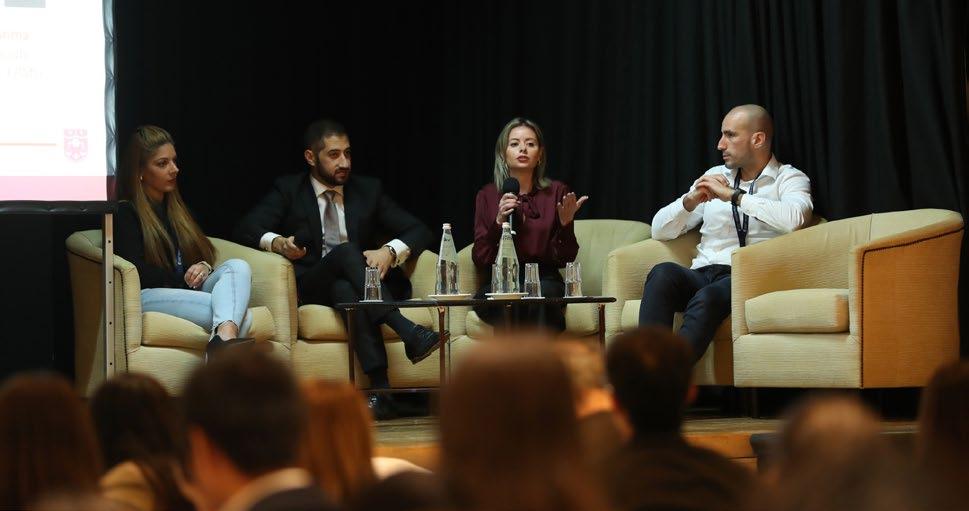
25.01.2023
The Institute was invited to deliver a practical informative session on ethical issues to first year students who are part of the Advanced Diploma in Accounting at the Malta College of Arts, Science & Technology (MCAST) as part of their Ethics for the Accountant unit.



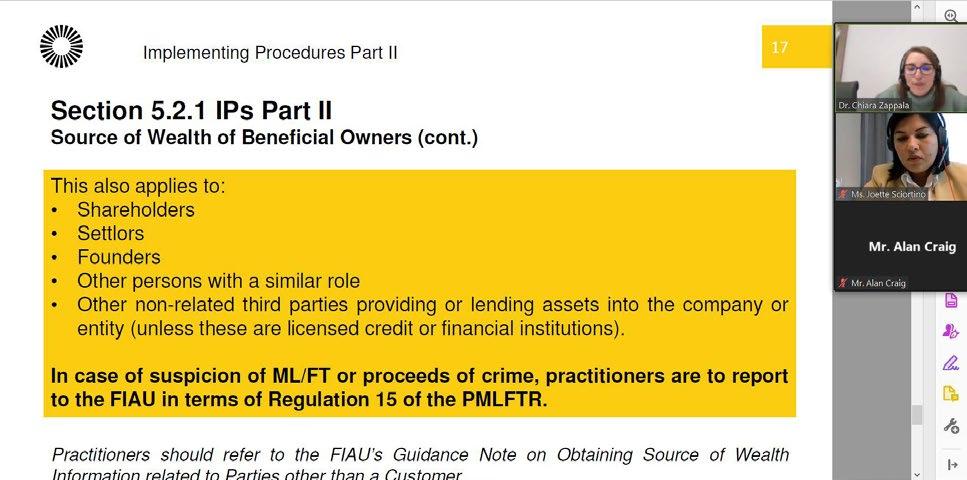
27.01 | 03.02 | 22.02 | 24.02.2023
The Institute, in collaboration with the FIAU, has followed up the Procedures’ implementation through an extensive CPE programme split over four sessions, each of which dealt with different specific areas of the IPs, to ensure that the profession is able to quickly and thoroughly embrace these developments, whilst being fully aware of what is expected of it.

08.02.2023
The MIA Sustainable Finance Learning & Education Working Group, under the remit of the MIA Sustainable Finance Committee, organised a 2-hour CPE session tackling the fundamentals in the world of ESG, namely the history, the regulations at play as well as the impact on the accountancy profession. One key message which resonated throughout the session was the need for the profession to act now and be prepared.
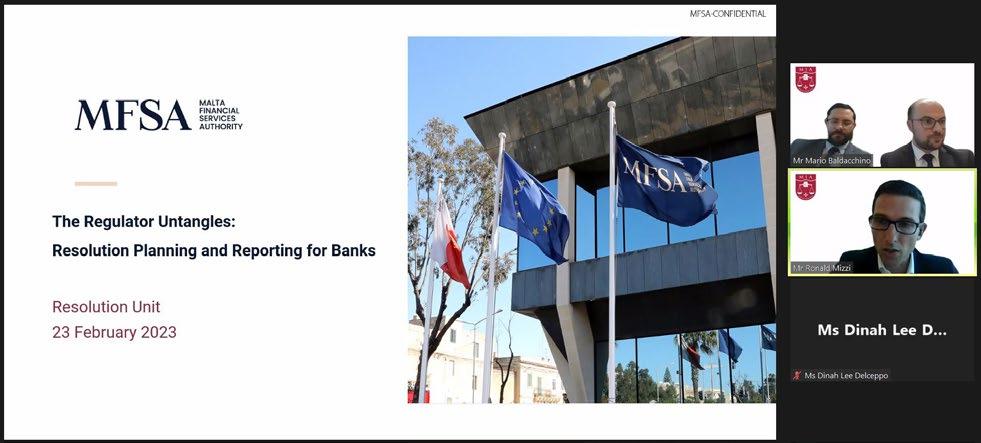
23.02.2023
Resolution planning and reporting for banks was tackled in a CPE session organised by the MIA Financial Services Banking Working Group, under the remit of the Financial Services Committee. This session, which also saw the participation of MFSA’s Resolution Unit Head, Mr Christian Buttigieg, and Deputy Head, Mr Mario Baldacchino, dealt with the relevant framework, common challenges and recommendations as to how these could be addressed, as well as expected changes.
in collaboration with the FIAU & MBR 18.01.2023
A full house at the Radisson Blu Resort for the first major event of the Institute for 2023, the AML Conference, which focused on the recently published FIAU Implementing Procedures (IPs) targeting accountants and auditors.


Mr David Delicata, MIA President, expressed appreciation on how the accountancy profession has embraced compliance, stepped up its game and strengthened its position as a gatekeeper against illegal financial activity.
The MIA’s CEO, Maria Cauchi Delia, emphasised how the new procedures were developed following extensive exchanges between the Institute and its AML Committee, providing the opportunity to reflect practitioners’ concerns on various aspects. She noted how the new IPs provide more certainty to the professional by addressing grey areas and specific nuances which to date, were not exhaustively dealt within the regulatory framework.
Through an engaging mix of presentations, fireside chats and panel debates, participants were taken through the key elements of the IPs, ranging from the implementation of a risk-based approach to reporting obligations and obligations relating to ongoing monitoring and record-keeping, as further
explained in the new IPs. Through the participation of the regulators themselves, namely, the FIAU and MBR, focus was also made on those areas which professionals often seek clarification on. Among the high-level speakers addressing the conference were MBR CEO and Registrar Dr Geraldine Spiteri Lucas and FIAU Deputy Director Alfred Zammit, together with a host of experienced practitioners in leading local firms and other representatives from the regulatory agencies. The use of case studies by the different panels ensured that practitioners could fully comprehend the application of these various aspects in practice.
Other elements addressed during this event included the recent Court of Justice of the European Union (CJEU) decision which declared as illegal the provision of unrestricted public access to business ownership information together with the development of plans to establish a central due diligence repository.

As the rapid economic growth that our country experienced in the past decade faces the challenge of higher commodity prices and interest rates, an ongoing war on our continent and a stream of tax reforms, many are asking where the next wave of growth will come from. Change is inevitable, and rethinking our strategy in the aftermath of the crisis is particularly timely.
Faced with the prospect of inevitable change, economies and their stakeholders have no option but to rethink the way they operate and reform to remain relevant. Malta is no different. The MIA’s 2023 Biennial Conference will provide the right platform to move forward from statements of goodwill to effective proposals that deliver tangible change and transformation.
Industry leaders, experts, members of the accountancy profession and the various stakeholders that together make up the Financial Services industry will be asking poignant questions and

seek answers to which are the critical enablers in a healthy financial system and what is needed to build on existing competencies and achieve growth and success in newly emerging elements of our industry. In this context, keeping also in view that digitalisation is transforming the way we go about our work, the Biennial Conference will provide a chance to discuss opportunities, such as fintech and digital payments, and other key matters, including the role of corporate taxation within the ambit of an evolving local tax system.
This year’s event, being held in collaboration with the Malta Financial Services Advisory Council (MFSAC), will also provide participants with the opportunity to receive first-hand insight on their newly developed financial services strategy. The plan, which was developed with the active participation of more than 100 financial services professionals, examines current industry constraints while also highlighting fresh areas where businesses should search for growth opportunities.

The Malta Financial Services Authority (MFSA) has published its strategic statement containing its strategic plan for the three years ahead with the key objective of securing Malta’s future as a resilient and efficient jurisdiction. The Authority identified 27 priorities linked to its statutory mandate – financial stability, market integrity and consumer protection – in the near and longer term. Through this statement, the MFSA is committing itself towards stronger efficiency, effectiveness and adaptability both for the Authority, internally, and for its stakeholders. The Strategic Statement is available online on the MFSA website
The Malta Business Registry (MBR) has announced a major restructuring in its Registry operations, with the objective of enhancing its ability to offer a more efficient and homogenous service with a more specialised structure. Further details are available on the MBR website
The European Commission and the Maltese Government have formally launched the European Union operational programmes and plans allocated for Malta from 2021 to 2027, with a package exceeding €2 billion. The national authorities will be focusing on utilising these funds in order for the economy to be more competitive and sustainable whilst accelerating its green and digital transition. Further information is available on fondi.eu.
Accountancy Europe (AE) have published their proposed recommendations for an audit committee’s future-oriented and evolving role, examining how corporate reporting fraud can be tackled. This publication is available on the AE website
The International Sustainability Standards Board (ISSB) has now agreed on all the technical content of the two initial standards, S1 and S2, as well as the effective date, which will be the start of January 2024. S1 and S2 are expected to be issued towards the end of quarter 2 2023 and, in line with this, the ISSB unanimously approved to enter the thorough drafting and formal ‘balloting’ process of the Standards. More information is available on the IFRS website.
The International Federation of Accountants (IFAC) has released a new tool, offering tips to auditors in relation to the implementation of ISA 315 (Revised 2019). This standard is effective for audits of financial statements for periods beginning on or after 15th December 2021. This new resource is available on the IFAC website.
The International Ethics Standards Board for Accountants (IESBA) has released final revisions to the International Code of Ethics for Professional Accountants. These revisions address various independence considerations in a group audit, as well as implications of the changes made to the definition of an engagement team. More information is available on the IESBA website.



The Office of the Commissioner for Revenue (OCfR) is embarking on a challenging but exciting journey, to digitally transform the Tax and Customs Administration into a modern organisation implementing best practices, using leading technology and becoming an employer of choice.
To kick-start this transformational change, the OCfR is planning to publish its three-year strategy plan, which is also confirmed and supported by the International Monetary Fund (IMF).

These changes are being implemented with clear goals to:
• be pro-active and customer centric;
• be data and intelligence-led;
• have local and foreign alliances and collaborations across all the Departments within the OCfR and the Customs Department;
• have organisational and policy agility through innovation and change;
• have a motivated workforce with high retention rates; and
• be focused on achieving voluntary compliance whilst having a strong enforcement culture.
A key pillar of such changes is the strengthening of its governance structure, wherein it is being planned that the policy will be entrusted to a Board of Governance, while the execution of policies and operational functions will be under the CfR assisted by an Executive Committee made up of the appointed Directors General. The current legislation is planned to be amended to include the appointment of a Board of Governors.
The second pillar of this reform is the implementation of a re-defined organisational design structure, leading to consolidation and integration across all functions, eliminating duplication and maximizing on resources, thus achieving higher levels of performance and efficiency.
The current business systems are planned to be upgraded, and an extensive re-engineering exercise planned to be carried out, thus enabling the tax administration to become a data led and data driven organisation. In this regard, this Office is planning to automate some of its processes and increase its digital services to improve voluntary compliance, by investing in an integrated Artificial Intelligence single platform that will enable it to take evidence-based decisions and to provide easier and simpler access to its services while ensuring efficiency in the collection of taxes.
Furthermore, the current stand-alone legacy information systems are planned to be modernised into the latest technology-driven Integrated Tax Administration system that will make it possible to provide a simplified tax administration process and user-friendly digitised service, thus ensuring better timeliness, reliability and efficiency.
We have demanding but exciting times ahead, however, with the collaboration and support of all stakeholders, the Tax and Customs Administration will be modernised to operate in a digital era, to provide a more streamlined service experience.
As Mazars is celebrating its 25th anniversary in Malta, we are committed to continue investing in the values and strengths which have defined our success. The firm’s fundamental purpose and vision is that of creating value together with our stakeholders, and investing in what matters for our people, our clients and the local community. At Mazars, we stand by our commitment to continue acting responsibly, in the public interest, and for future generations.

Our Services:
• Audit & Assurance
• Risk Consulting
• Financial Advisory
• Outsourcing
• Payroll
• Taxation
On 18 November 2022, Transfer Pricing Rules (the Rules) were introduced in Malta through Legal Notice 284 of 2022.
The Rules are based on the draft rules that were included in the document issued for public consultation by the Commissioner for Revenue (CfR) in December 2021.
In this context, transfer pricing concerns the prices charged between associated enterprises established in different jurisdictions for their inter-company transactions.
The introduction of transfer pricing rules means that enterprises entering into transactions within the scope of these rules will have to ensure that their related party transactions are in line with the arm’s length principle. Cross-border transactions between related parties should yield an amount that is similar to what would have resulted if similar transactions were entered into with independent parties.
This is a challenge for tax authorities and taxpayers given that determining the transfer price on crossborder transactions between related parties is not always a straightforward exercise. The rise of transfer pricing regulations and enforcement makes transfer pricing a major tax compliance matter that needs to be addressed.
The rules will apply to basis years commencing on or after 1 January 2024 in relation to arrangements entered into on or after that date and arrangements entered into before that date that are materially altered on or after that date.
At this stage, there is no guidance on the interpretation of what may constitute a material alteration to an arrangement.
Which enterprises fall within the scope of the Rules?
Micro, small and medium-sized enterprises (SMEs) are excluded from the scope of the Rules (i.e. those entities fulfilling the criteria laid down in Annex I of Commission Regulation (EU) No 651/2014, as per the table below). In assessing the size of enterprises, one would need to consider:
1. the staff headcount; and
2. whether either the turnover or balance sheet total exceed the thresholds referred to in the table below.
The Rules will therefore apply to enterprises that would be classified as “Large” as they would not fall within the SME thresholds set out in the table below.
For such classification, these thresholds are to be assessed by reference to the entire group of companies, taking also into consideration group companies outside of Malta (i.e. not by reference to an entity in isolation).
Which transactions fall within the scope of the Rules?
The Rules apply to cross-border arrangements entered into between associated enterprises. Any transactions between Maltese-resident entities are excluded from the scope of the Rules.
Securitisation transactions in terms of the Securitisation Transactions (Deductions)
Rules are also excluded from the scope of the Rules. The Rules will also not apply where in the year preceding the year of assessment, the aggregate arm’s length value of all items of income and expenditure of:
1. a revenue nature forming part of cross-border arrangements does not exceed €6,000,000; and
2. a capital nature forming part of cross-border arrangements does not exceed €20,000,000.
If one of the above-mentioned thresholds is exceeded, then cross-border arrangements of such an enterprise will fall within the scope of the Rules.
The definition of associated enterprises has been updated following the public consultation.
In terms of the Rules, bodies of persons will be considered associated enterprises when there is direct or indirect control through a holding of more than 75% of either:
• voting rights; or
• ordinary share capital; or
• by any powers conferred by the Articles of Association or other document regulating the controlled body of persons.
Bodies of persons subject to common control by virtue of the above-mentioned threshold (75%) will also fall within the scope of the Rules.
Where bodies of persons are constituent entities of a multinational enterprise group, and thus subject to country-by-country reporting obligations, the percentage interest in the voting rights or the ordinary share capital referred to above will be 50% (rather than 75%).
The Rules set out that the following instances constitute a cross-border arrangement:
1. an arrangement between a Maltese-resident company and a non-Maltese-resident party;
2. an arrangement between a Maltese-resident company and a permanent establishment situated outside Malta to which the arrangement is effectively connected; and
3. an arrangement between a company that maintains a permanent establishment in Malta to
which the arrangement is effectively connected, or otherwise derives income or gains arising in Malta, and a non-Maltese resident party.
Thus, local groups operating in Malta, but which have a permanent establishment outside of Malta, may also fall within the scope of such Rules (depending on the size and de minimis thresholds).
The Rules provide a framework for requesting and issuing a unilateral transfer pricing ruling and advance pricing agreement (APA).
A unilateral transfer pricing ruling is a ruling issued by the CfR that determines, in advance of an arrangement, an appropriate set of criteria for the determination of the transfer pricing for that arrangement. A unilateral transfer pricing ruling is binding on the CfR for a period of five years from the date the ruling takes effect. The CfR may, however, decline to issue a unilateral transfer pricing ruling where the Income Tax Act (including any rules, regulations and guidelines issued thereunder) provide sufficient certainty regarding the tax treatment of the relevant transaction.
An APA is a voluntary agreement between a taxpayer and one or more tax authorities that allows the parties to agree in advance on the transfer pricing methodology for any given intercompany transaction(s) for a specific period of time. The main benefit provided by an APA for a taxpayer is the ability to obtain some degree of certainty regarding how the law will be applied in a given set of circumstances.
An APA may be entered into for a duration not exceeding five years from the date the APA takes effect as determined during the relevant mutual agreement procedure.
The Consultation Document published in 2021 referred to guidelines expected to be published by the CfR to provide the taxpayer further guidance in relation to such Rules. One would expect such guidelines to provide guidance on various points.
Amongst others, the Rules do not provide any detail on the Transfer Pricing Documentation that is expected to be held and, in this regard, one expects that guidance is issued in relation to the documentation obligations.
Furthermore, the Consultation Document also made reference to the Organisation for Economic Cooperation and Development (OECD) Transfer Pricing Guidelines. In this respect one also expects that reference to the OECD Transfer Pricing Guidelines will be included in the guidelines.
Taxpayers falling within the scope of the Rules should use 2023 as an opportunity to identify any crossborder arrangements with associated enterprises and assess and document the rationale behind the pricing for such transactions.
Authors
Audrey Azzopardi, Senior Manager PwC Malta
Audrey is a senior manager within the PwC Malta Tax and Legal line of service. She is an accountant specialising in the taxation of corporate and international tax law. She participates in various in-house seminars and lectures, and regularly contributes to the firm’s local and global publications.
Abigail D’Amato, Senior Manager PwC Malta



Abigail is a senior manager within the PwC Malta Tax and Legal line of service. She provides tax advice to international corporate clients in various industries on Maltese tax-related matters with a special focus on Transfer Pricing.

Mr. Colin Calleja has been appointed as a Director of Risk at BDO Consult Limited, effective 24th February 2023.
Mr. Ivan Spiteri has been appointed as a Director of Technology Advisory and Assurance at BDO Technology Advisory Limited, effective 1st February 2023.





Ms Anita Grech has been appointed as Audit and Assurance Partner at Mazars in Malta, effective 1st January 2023.
Grant Thornton has announced the appointment of four Directors: Mr Michael Agius as Tax Director, Mr Russell Camilleri as Business Process Solutions Director, Ms Jessica Borg as Corporate & Regulatory Associate Director and Mr Daniel Farrugia as Information Technology Associate Director, with effect from 1st January 2023.

The architecture of the Maltese economy is nowadays defined across balanced lines. At the base, there stand the six pillars that largely generate the export capability of the economy, which are critical to provide the necessary resources to sustain such a small, and by consequence, open economy. As shown in the diagram, these include manufacturing and tourism, but also extend to a significant input from high-value added service activities including financial, ICT, professional/ administrative and gaming services. These six base sectors generate around 55% of the total activity of the economy, of which approximately 70% can be ascribed to the mentioned high-value added service activities.
The choice for Malta to develop these sectors over time was not haphazard. Given the smallness of the economy and of its labour force, it makes sense for it to concentrate on a few key activities which are well-differentiated from one another, to minimize the impacts of adverse shocks. They are also sectors in which it is possible to build a competitive advantage in the international market in spite of - or at times because of - operating at a relatively
small scale. This said, it is obvious that this pattern of growth would not have been possible in the absence of Government support to businesses in a number of forms, in order to overcome the market failures generated by the size and peripherality of the Maltese economy.
Other economic sectors are mainly oriented to meet domestic demand, which would in turn be enabled by the original injections of income earned through export activities and spent again in the local economy. These account for 45% of total economic activity, and include primarily construction and real estate, the domestic aspects of retail, transport and accommodation, education and health, public administration and other activities including agriculture and fisheries.
In a sense, while the export base sectors represent the engine through which the Maltese economy earns its livelihood, the domestically oriented sectors represent the processes through which it consumes. The excess of income over consumption would represent investment, which would enable future growth.

Critical to the success of this approach to growth is the necessity for the Maltese economy to re-invent itself periodically to meet impending challenges and opportunities. Looking back, ever since obtaining independence, the approach to business activity development had to be adjusted or modernised every ten years or so. This started with an injection into construction expenditure in the 1960’s, to low-cost manufacturing and tourism in the 1970’s, all the way to high value-added export-oriented service activities based on foreign direct investment over the past decade and a half. Over the past ten years, growth was also sustained by, and effectively attracted, a significant inflow of foreign population, which also sustained tourism and real estate development.
The ongoing structure of economic activity is facing obvious challenges. Infrastructure shortcomings related to the provision of quality housing, transportation, and waste management are affecting wellbeing, the costs of doing business, and the environmental performance. The country must pace the supply of infrastructural services with the demand, making due allowances for future growth especially as investments would be indivisible and not easily repeatable in the near future. This said, it must balance, and indeed make the best of, costly hard infrastructural approaches with the more immediate and cheaper benefits that can be attained through behavioural changes.
A shortage of skilled workforce in certain sectors, such as ICT and financial services, is limiting the growth potential of these industries and hindering
the country’s competitiveness. To a great extent, these issues are intertwined in what could become a vicious circle of immigrant population growth placing excessive burdens on the infrastructure which would then reduce the ability of the country to attract the necessary quality human capital.
It is also clear that an excessive dependence on tax attractiveness to bring about the necessary foreign investment to the country is becoming increasingly non-viable. Global trends towards minimum taxation and other harmonisation efforts will inevitably, and possibly rapidly, percolate to Malta. It is useless for the country to resist these changes, especially as it strives to continue to rebuild its reputation following the very successful and rapid exit from the FATF grey-listing status.
It is however also true that the country’s economic structure must remain dependent on fiscal assistance for yet quite some time, and the withdrawal of this must be gradual, planned, and sustained by alternative instruments. This will be possible if fiscal support is combined with the inculcation of global economic priorities, such as the fight against climate change and against financial crime, within the specific sectors of activity which Malta would be entering. In turn, Malta must become increasingly selective in the investment that it is targeting, which would be consistent in offering support in manners which are justifiable and not deleterious to its reputation. This would also bring distinctiveness in its export offering, which can be built into a competitive advantage.
Another major challenge to the ongoing economic model is environmental sustainability and the related implications for the quality of life. The culture and mentality which prevails nationally is one of conflict between this and economic success. Our society is taking a typical village feast approach to the delicate balance which is to be sought in this crucial ambit. True to our colonial divide-and-rule frame of mind, an “us against them” scenario has formed, where two camps are fighting battles which are mainly intended to destroy one another, rather than to find the constructive and common good to move things forward productively. Regulation has a critical role to play in this context, and over the decades, it does not seem to have helped sufficiently to generate the much-needed outcomes. Our territory is small and our resources are extremely limited compared to our ambitions. Therefore, all the mistakes that we make will have very visible and long-lasting effects on our incomes and quality of life.
The narrative in the country must change to one where the longer term social good prevails. The economy will not thrive in a depleted environment, but neither will our society reach its aspirations if economic initiative is halted simply for the sake of stopping economic growth.
Going forward, the time-proven recipe of a highly productive and diversified export-oriented base that is strongly sustained by foreign investment must be retained and reinforced. To do this, it is clear that the economy must re-invest itself in four critical dimensions which are fundamental to all of its efforts. These are:
• engaging in proper long term infrastructural planning accompanied and reinforced by behavioural changes;
• focusing on skills in terms of attracting quality human capital within a typical Mediterranean lifestyle;

• sustaining the model of fiscal efficiency and effectiveness through methods which are justifiable through a selective approach to quality growth, consistent with reputation building, and harmonious with global economic, social and environmental efforts;
• shifting the narrative away from internal confrontation to collaboration towards shared ideals and objectives, especially in creating the necessary synergies between economic growth and environmental sustainability.
It is my firm belief that the financial sector, and the wider community of businesses engaged in higher value-added sectors, which nowadays constitute more than one third of overall economic activity and two-thirds of the export base, have a significant role to play in engendering these results, through active ESG policies in line with global developments. Spurred by these and parallel initiatives, these common goals would in turn permeate the construction, real estate, tourism and manufacturing sectors, whose long-term sustainability is equally key to the economy if it is to continue to provide for and meet the ambitions of its society in the decades to come.
Dr Gordon Cordina is a leading economist in the Maltese Islands, with a professional experience spanning 25 years covering banking, policy-making, academia and private sector consultancy. He is a graduate of the University of Cambridge and the University of Malta. He currently chairs the Board of Bank of Valletta.
In this article, we interview Massimo Avellino (MA), Chief Officer, Consultancy Services at Smart Technologies Limited, and John Montanaro (JM), the company’s Chief Revenue Officer, about the features and benefits of Oracle NetSuite’s Cloud Financial Management Solution.


MA: NetSuite Financial Management has achieved a reputation as the number one cloud financial management solution, namely due to its potential to expedite daily financial transactions, reduce budgeting and forecasting cycle times, ensure compliance, and accelerate the financial close. This cloudbased platform delivers real-time visibility into the financial performance of any business, from a consolidated level down to individual transactions. Moreover, NetSuite Financial Management seamlessly integrates with additional business applications, including order management, inventory, CRM (Customer Relationship Management) and commerce. This means that one can run an entire business with a single solution.
As you mentioned, NetSuite’s Financial Management package is a cloud-based solution. Why is that so important?
MA: When you are considering an ERP (Enterprise Resource Planning) solution for your business,
one of the most important things is to select a cloud-based ERP solution. Significantly, NetSuite’s is a true cloud ERP – which means that it was designed from the outset as a cloud solution. This means that each customer accesses the exact same software application and its services. So, when it comes to upgrades, it is this software – the core solution – that is upgraded, not the customers’ own ERP software. Moreover, when new functionality is rolled out, the customer has immediate access to that, without any down time or services being rendered unavailable to employees. A true cloud ERP solution like NetSuite also allows clients to customise their own application of it. Customisations allow a business to tailor the software for their own business processes, in order to improve their productivity and gain better insights into their data. With NetSuite’s cloud capability, you can also access your system anywhere, on any device. All you need is a web browser and internet connection. This means that you can stay up to date when away from the office. Moreover, accessing NetSuite ERP software from anywhere assures business continuity for a company.
Which key areas of NetSuite’s financial management platform can prove to be an important asset for finance and accounting professionals?
MA: In my opinion, NetSuite Financial Management addresses three key areas of interest to finance managers and accounting professionals. First of all, it lets you manage your financial processes efficiently. NetSuite helps you automate a range of complex financial processes, from bank reconciliation and assets management,
to receivables, payables, revenue management and more.
From a management point of view, the adoption of NetSuite’s financial management solutions allows you to drive business strategy and growth - the platform’s financial, headcount and operational data lets you quickly and easily produce budgets and forecasts, model what-if scenarios, and generate reports.
From an operational perspective, NetSuite Financial Management allows the finance and accounting professional to close with confidence, accelerating the financial close while maintaining compliance with accounting standards. It also enables reporting with accuracy, facilitating the drilling down into underlying details, and allowing a better understanding of the impact on your business. Finally, it gives one access to realtime information, with real-time metrics and role-based dashboards designed to improve performance.
Can you give us an overview of how NetSuite has packaged its solutions?
JM: NetSuite has packaged its comprehensive offer to finance and accounting professionals along seven product lines: NetSuite Cloud Accounting Software, NetSuite Billing, NetSuite Planning and Budgeting, NetSuite Revenue Recognition, NetSuite Financial Reporting, NetSuite Financial Consolidation, and finally, NetSuite Governance, Risk and Compliance. The underlying objective of these various modules of NetSuite’s financial management platform is to facilitate the automation of core finance and accounting processes, provide detailed insights into the performance of the business, and reduce the risk of reporting errors, allowing greater control over the firm’s financial assets.
How can the adoption of NetSuite’s Financial Management platform benefit local enterprises?
JM: The adoption of NetSuite’s financial management solutions can definitely help local
companies become more agile, operate more efficiently, and collaborate more effectively internally in order to improve performance across the organisation. I believe that NetSuite Financial Management has particularly proved its worth in the past couple of years, as it has allowed our clients to face the changes and challenges experienced in our market environment with greater confidence.
More specifically, NetSuite’s financial management, budgeting and planning solutions have given our clients the tools and insights they need to balance short-term priorities and long-term objectives, helping them make more informed decisions about how they use their financial resources.
How has NetSuite Financial Management affected the way your clients’ accounting teams work, as well as their performance?
JM: The feedback that we have obtained is that the extraordinary degree of automation and intelligence offered by the platform has dramatically reduced the need for our clients’ staff to perform mundane and repetitive tasks. It has also led to increased data accuracy, allowing management to spend more time on data analysis, planning future growth and making long-term strategic decisions. In general, the combination of automation, intelligence and a unified technology platform has improved their operations by enabling their finance and accounting team to focus on managing exceptions, instead of performing time-consuming manual tasks.
Our clients also tell us that while many accounting professionals dread the words “month-end close”, NetSuite has helped them eliminate many of the headaches, much of the overtime, and the intensive effort required to close the books. They also mention that the implementation of a dedicated NetSuite Financial Management budgeting solution has particularly enhanced their capabilities for revenue and expense projections to help them automate the company’s budgeting process, eliminate manual data collection, and reduce budgeting cycle times.
The Financial Services sector has been a mainstay of economic growth for the past couple of decades. The Accountant sat down with Joseph Zammit Tabona for a frank discussion on the role of the Malta Financial Services Advisory Council and the future of this industry.
The financial sector in Malta has grown consistently and rapidly during the past few decades and, in particular, since membership in the EU back in 2004. The industry contributed €1.24 billion to the Maltese economy in Gross Value Added in 2021. It has grown at a compound rate of 8.3% since 2010.
Yet the industry is highly-competitive and rapid technological changes and regulatory development require swift action for Malta to maintain a competitive edge. Aware of the need to proactively future-proof the industry, the Malta Financial Services Advisory Council (MFSAC) was set up in January 2021 with representatives from various bodies, including the Malta Institute of Accountants, to face up to this challenge.
Mr Joseph Zammit Tabona, the body’s first Chair, says the Council is drawing up a long-term Strategic Plan for Malta’s Financial Services industry. It will also put forward regulatory and legislative changes to improve the industry while recommending how technology
and innovation can positively impact the sector. The MFSAC will seek ways to strengthen Malta’s access to skilled and capable talent in this area as well as professional development and education relating to the industry. Another important aspect relates to the promotion of the island’s capabilities to international markets while advising the Government of Malta on matters relating to the industry.
The strategy, publicly launched in March 2023, is the fruit of the contribution of over 100 financial services professionals – with active involvement from various government and regulatory agencies, such as the Financial Intelligence Analysis Unit (FIAU), the Malta Financial Services Authority (MFSA), the Malta Business Registry (MBR), the Central Bank, the Commissioner for Revenue, the Malta Stock Exchange, FinanceMalta as well as the private sector, represented through the Malta Institute of Accountants (MIA), the Institute of Financial Services Practitioners (IFSP), the Malta Bankers Association, the Malta Institute of Taxation (MIT) and numerous other entities as well as respected individuals.
Mr. Zammit Tabona emphasises that “this active collaboration across the private sector, government and regulators makes this strategy unique and ensures that it is all encompassing – that nothing is missed. This will ensure its success”.
The strategy itself initially identified some 177 initiatives or opportunities for change. Work on a number of them has already started and a few will be addressed within the coming months. “While there will be quick wins”, Mr Zammit Tabona explains that “this strategy also needs to be there for the longhaul to have a real transformative impact on the industry. In addition, the strategy itself will need to be constantly updated, changing and adapting to reflect evolving market dynamics as well as the challenges identified through the implementation processes and emergent opportunities”.
Mr Zammit Tabona believes that implementing this strategy will be critical to re-energise this sector and drive growth. “The approach is clear – first deal

with the fundamentals, ensure that we do them well, harness technology and deliver consistently. Then, once that is established, look at new product areas and opportunities to broaden Malta’s offer into other sectors”.
Among the areas the strategy group is looking to develop is aircraft leasing, complementing recent inroads in aircraft maintenance and its successful aircraft register which is a good fit in terms of local capabilities in financial services. Another potential area revolves around the maritime industry. “Having the largest shipping register in Europe can also serve as a source to attract ship owners to set up Family Offices in Malta – an opportunity for one strong niche to help create another”, he explains.
Sustainable finance is also with perceived potential. “While still at the early stages, related developments, including the Corporate Sustainability Reporting Directive, are going to drive change in the way financial reporting and corporate governance take place – and, in each and every change, there is opportunity”, Mr Zammit Tabona further explains.
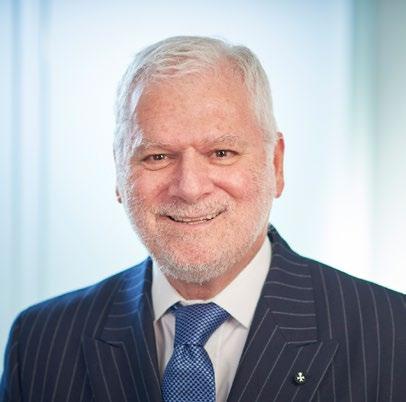
“As a sector, part of the strategic task moving forward within the strategy is to identify the critical opportunity areas where Malta can establish itself in providing unique services in this regard. We do not know how these will look, but we do have a team working through the expected changes and identifying where Malta can establish a competitive advantage”, he adds.
Despite this forward-looking approach, the work of the Council is also about identifying bottlenecks that hinder the industry’s performance. We ask Mr Zammit Tabona to identify what he sees as the main challenges the industry is currently facing and he highlights a number of issues which frustrate business operators. “The challenge of opening a bank account in Malta is known as an issue by all service providers. Bureaucracy, complexity, and time delays associated with the setup of local businesses remain a substantive issue. These issues are relatively easy to identify but more complex to address. While the regulatory bodies themselves are already addressing
some of these issues internally, coordinating and integrating processes and technologies across regulators and government agencies is much more complex. And then there are truly complex issues, and ones that require a substantial investment of capital and effort to change – such as the set-up of a local instant payments system”.
Another big challenge facing operators at the present time relates to ongoing and expected fiscal reforms. From a corporate taxation perspective, it is clear that the regulatory landscape is coming to a period of significant change. While it is not clear how Malta’s tax system will ultimately shake out, the MFSAC is pushing for a radical simplification of the tax system including its administration and to address revenue leakage head-on.
In this context, the MFSAC Chair explains, the Council’s strategy recognises that while Malta’s corporate tax system must remain a component of the ‘why Malta?’ proposition, the emphasis must shift away from tax being the primary motivating element, as may have been the case in the past, to the tax system being a material component of the overall value proposition for Malta.
As our exchange comes to a close, the topic of technology comes up in the context of driving meaningful change. “Technology is a critical underpinning to Malta’s overall success in the sector. Maltese companies need to be investing in technologies to improve their own service delivery, internal efficiencies and their overall competitiveness”. He adds that this approach is sometimes lagging, citing the example of the implementation of AML/CFT regulations, where most companies have tried to solve this problem simply by allocating more people to the task.
“Ultimately, I believe that all business leaders recognise that they will have to invest in technology to remain competitive. The key challenge to them is to do it proactively rather than either being forced by the market or as a late entrant – the benefits will accrue to those with the vision to smartly invest in technology to improve their operations, their service delivery and, as a result, their financial performance”.

Es ta bl ished by a tea m of repu ta ble pa r tners
Ma l ta ai ms to provi de loc a l busi nesses a nd s ta r t-u ps wi th a ser vice that u nders ta nds them a nd al lows them to real ise thei r ful l potentia l .
A s we operate i n a n i nc reasi ngly agi le busi ness worl d where i n novation a nd tec h nology ena ble busi nesses to tra ns form themselves cons ta ntly, i t becomes a lways c lea rer the im por ta nce of
a nd i nformation tec h nology a nd provi des them red uces i nterna l bu rea uc rac y a nd u nderpi ns the
Excel lence, I ntegri ty, Respec t, Tea mwork a nd I n novation . Apa r t from hel pi ng ou r c l ients u nders ta nd why they shou l d c hoose RSM as the
mem bers to th rive i n a n energetic envi ron ment that is su ppor ted by a tea m of exper ts a nd pushes ever yone to develop thei r skil ls to real ise thei r ful l potentia l .
Cu l tu re is not j us t a nother corporate buz z word . I n fac t, i t ensu res that tea m mem bers feel val ued , c a red for, trai n i ng oppor tu n i ties , c a reer grow th , a welcomi ng space for ever yone a nd events a nd i n i tiatives that bri ng the tea m together
In the Age of the Great Resignation, more firms are seeking to rely on foreign labour to shore up human resource requirements. With Identity Malta Agency (IMA) playing a key role in the process, we sat down with its CEO, Col. Mark Mallia for an open exchange on the evolving situation and challenges faced by firms.
How does IMA go about strengthening compliance given the increasing migratory pressure particularly as Third Country Nationals seek employment in Malta?
Identity Malta Agency (IMA) assists local businesses by providing employers with efficient and secure processes for hiring foreign workers while ensuring the security and integrity of Malta’s immigration system.
We have increased our engagement with all relevant key stakeholders, including the Immigration and District Police and Jobsplus, by filing reports on all incidents reported to us by third parties or individuals. The increased frequency of joint inspections with other teams from the Police force and Jobsplus is significant. To combat overstay abuse, we have increased checks in case of dubious documents such as lease agreements, increased follow-ups on other exploitations involving study Visas, and alerted authorities on individuals who are caught working illegally. Furthermore, the Agency agreed to conduct surprise joint inspections of educational institutions in collaboration with the Malta Police Force and the Malta Further & Higher Education Authority (MFHEA).
The agency started forging partnerships with other state agencies so that it could send data and conduct investigations. Additionally, we interview people every day about FOMs (Freedom of Movement) to establish that partners are truly living together. We have also increased physical inspections of temping agencies to promote awareness, while occasionally interviewing company officials. We have stepped up our investigations into fraudulent leases that the Expatriates Unit and landlords have brought to our attention. When necessary, we liaise with the police about potential arrests.
Along with this, we have intensified our investigations into potentially falsified health insurance policies and visa stamps that look dubious. Where appropriate, police action is also taken. In connection with this, the Agency’s Compliance Unit also follows up on Police investigations into incidents that were referred by the section itself.
The aforementioned Unit is also planning to increase its workforce within its inspection teams so that they can deploy during silent hours and carry out all necessary checks. All internal stakeholders were invited to regular meetings by the Compliance Unit to discuss specific responsibilities and obligations at law, which could help with their investigations. To improve cooperation and potential help during checks conducted by the Unit, we also started discussions with the Commissioner for Revenue.
It is no secret that several professional sectors, including the accountancy profession, are relying on third-country nationals given the lack of human resources on our shores. How is IMA addressing the bottlenecks in facilitating such processes which at times still take longer than one would legitimately expect?
In full compliance with the Government of Malta’s vision of achieving excellence in service delivery through technology, IMA has undertaken a significant change in customer service delivery. Following the overwhelming response to the Single Permit digital platform, the Agency launched new portals to provide online services: A Non-EU portal, a Premium Visa portal, and a D-Visa portal.
Every choice we have made has always put our customers’ needs first in an effort to deliver outstanding service that is effective, efficient, and timely. This was specifically taken into consideration when the Customer Support and Response Unit was established last year.
The Agency has always prioritised streamlining of administrative procedures whilst protecting national security. Due to the deployment of two cutting-edge biometric capture workstations (BCWs) last year, one of which is in the Expatriates Unit, a more efficient and high-quality biometric process is now feasible. Due
to the doubled capacity for biometric appointments as a result of this deployment, the waiting time for appointments was comparable to years with fewer applicants, despite having significantly more application submissions.
Furthermore, IMA hired additional personnel, who were trained in the processing of Visa applications in collaboration with the Ministry of Foreign and European Affairs and Trade. As a result, more applications could be evaluated and processed at the same time without jeopardizing national security. Also, Identity Malta, in collaboration with Jobsplus, are issuing an interim receipt that grants the right for third-country nationals to temporarily reside and work in Malta while the due diligence process is underway.
On the other hand, would you have any recommendations to professionals and firms in view of improving the workflow between authorities and industry?
Establishing clear lines of communication and regularly scheduled meetings between all stakeholders involved is vital to ensure all relevant information is shared and any enquiries addressed. I believe in collaborative decision making, and I encourage this between authorities and industry to ensure the best outcomes for all stakeholders.
To expedite the hiring procedure, employers may opt to employ individuals from other EEA or EU nations, countries where Visas are not necessary, and therefore speeding the process automatically, as such workers may begin working instantly. All other employees must wait for their Approval in Principle Letter before starting a separate application for a Schengen Visa, while workers from countries that require Visas must wait for their Approval in Principle Letter before they may depart for Malta.
Other companies or employers could favour hiring staff through the Key Employment Initiative method which provides a fast-tracked service to highly specialised third-country nationals who apply for management or highly technical positions that need necessary
education or sufficient experience connected to the position being applied for and who can travel, live, and work here.
While as an agency you are responsible for implementing existing legislation and regulation, through your direct contact with stakeholders you will certainly acquire significant visibility of policy limitations. How do you seek to address these? How do you relate with third parties to improve business’ needs?
We regularly engage with stakeholders, including businesses, to understand their needs and identify any limitations in existing policies. The Agency also uses data analysis to identify trends and areas for improvement in the implementation of policies and regulations. It is important to continuously consult with experts in relevant fields to gain additional insight and identify potential solutions to policy limitations and continuously assess and improve processes and policies to ensure they remain effective and responsive to the needs of the businesses.
Additional exciting developments are on the way in the form of new advancements in identity security. Preparations are already well on to consolidate the Agency’s Gozo operations into a single one-stop shop. Additionally, there are discussions afoot about digitising more of the Agency’s services and better integrating online systems with other pertinent parties. We must streamline bureaucracy and increase service efficiency.
As an Agency, we will continually assess and adapt to the changing needs and demands of our stakeholders, including the public and private sectors. This may involve implementing new technologies, improving processes and services, and ensuring that our operations are aligned with current and future technology standards. Ultimately, the success of IMA will depend on its ability to effectively respond to these challenges and continuously meet the needs of our country, stakeholders, and the public.
Col. Mark Mallia was appointed Chief Executive Officer of Identity Malta Agency in January 2022. Before joining IMA, he held various high-ranking positions in the Armed Forces of Malta for many years, after having joined in 1997 as an Officer Cadet. Col. Mark Mallia holds an Executive Masters in Business Administration, a Bachelor of Laws (Honours), and a Diploma in Management Studies, all from the University of Malta.

Accountancy Europe is the umbrella organisation for 50 professional accountancy bodies in 37 countries. Its mission is to facilitate members cooperation, dialogue with policymakers and help shape the profession’s future. MIA joined Accountancy Europe in 1989.
Mark Vaessen took over as President of Accountancy Europe on 1 January 2023. Mark is a senior partner with a focus on sustainability at KPMG in the Netherlands and has expertise in capital markets, global standards, and EU regulatory issues. Until end of 2022, he headed the national Department of Professional Practice. Prior to that, Mark led KPMG’s International Standards Group in London and its network of reporting specialists for nearly 20 years. He served on several European financial committees and the International Financial Reporting Standards (IFRS) Advisory Council of International Accounting Standards Board (IASB). We are delighted he took the time to speak with us about Accountancy Europe’s strategy for this 20232024 term.
What do you see as the most imminent challenges to tackle as a European profession?
Where to begin… the first scenarios that come to mind are the global climate catastrophe and the war on the European continent that will shape everything we do.
We have developed a flexible and ambitious strategy for 2023-24 to respond to the main challenges that are impacting people, the profession and our planet. We must also be able to quickly adapt when the political agenda changes. Hereby we prioritise to:

• support a sustainable and just transition, including for small businesses and the public sector;
• advance the corporate governance ecosystem, including the role of audit; and
• shape the profession’s future and attractiveness.
How will Accountancy Europe achieve those strategic priorities?
Sustainability is at the heart of our profession and takes centre stage position in reporting, assurance and small and medium-sized enterprises (SMEs) matters. Professional accountants have already been providing assurance services on sustainability information for a long time. We will of course keep monitoring closely how the new Corporate Sustainability Reporting Directive (CSRD) replaces the Non-Financial Reporting Directive (NFRD), significantly strengthening social and environmental information rules for companies. Additionally, we will drive high-quality sustainability assurance in the public interest and support the educational requirements placed on accountants in this regard. The sustainability agenda provides a huge opportunity for the profession to play its role and add value to society.
From your perspective, what are the key points in shaping the EU’s green future?
The Commission has been progressing on setting sustainability reporting standards to support the implementing of its Green Deal. Personally, I think that Europe needs to engage with global players and find a solution that is practical for companies and regulators. To be effective, standards should be simple and clear. Granular requirements may impair effective reporting.
Accountancy Europe has strongly advised European Financial Reporting Advisory Group (EFRAG) to improve the double materiality concept1, as impacts to people, the environment and enterprise value are interlinked. Aligning terminology and approach with
1 https://www.accountancyeurope.eu/consultation-response/ efrag-ptf-esrs-exposure-drafts-on-european-sustainabilityreporting-standards/

the International Sustainability Standards Board (ISSB) and Global Reporting Initiative (GRI) is also necessary.
Finally, to be truly sustainable, we must also rethink our tax systems to face 21st century challenges. This is why Accountancy Europe has been active in that debate2. As a profession, we want to have a positive impact on those discussions.
Where does that leave Small and medium enterprises (SMEs)?
SMEs can also thrive in the sustainability context. New business models and changing supply chains that are emerging as a result of addressing matters such as climate change, will also provide plenty of opportunities for SMEs. We encourage them to embrace the sustainable transition, relying upon their accountants in the process. Accountancy Europe issued a publication3 explaining how and why sustainability is important for SMEs.
We need to ensure that we assess the impact on SMEs and SME audits in all our projects. Improvements in auditing standards are usually aimed at public interest entity audits. On SME audits, those standards need to be applied in a proportional way. Accountancy Europe reminds standard setters and regulators of that reality. We will also evaluate the impact on SMEs from the CSRD. Small enterprises make up most businesses in the European Union (EU); they are therefore an essential part of our sustainable future.
Global crises, evolving stakeholder expectations, new technology... the ways of doing business in this context are changing fast. How can we avoid corporate incidents?
A stronger corporate governance ecosystem can reduce the risk of corporate failures and enhance focus on more sustainable companies. This requires a holistic approach based on three pillars: corporate governance, audit and supervision. Only when critical players take up their proper role we can strive to a stronger system.
At Accountancy Europe, part of our strategy is to listen, understand and then respond to stakeholders’ expectations and concerns with concrete suggestions for improvement. We will continue our efforts to equip the profession for future reforms and develop our work
on sustainable corporate governance and internal controls.
Speaking of audit, we are experiencing a shortage of qualified professionals. What are the reasons that you see for that?
We know that a future-proof and attractive profession is key to keep fulfilling our public interest role. Very strict requirements to enter the profession, challenging workloads, and high failure rates can discourage even the best candidates. There is an imbalance in that. Another reason I see is that, in some cases, a compliance mindset overshadows the use of professional judgment. Young professionals are interested by intellectual challenges. They should be encouraged to use their capabilities – including their proficiency in technology.
As in Malta you are experiencing a shortage of qualified professionals, other European countries also struggle, even though the situation differs as much as our Member Bodies do. We must make attractiveness a central theme underpinning all our activities and better connect with younger generations. I believe that the prospect of adding value to society through our role in the sustainability agenda is positive and we must build on that. We also need to look holistically at what motivates the young generation more generally. Models from the past may no longer be fit for the future.
You mentioned technology. What is Accountancy Europe planning to do in this space?
Auditors are embracing technology. It is essential to work on projects that highlight how the profession is using technology and can do even more with it to improve audit quality and efficiency. The possibilities of using data analytics are endless and should be used more widely and more efficiently. The emergence of Artificial Intelligence is another example of technology that can only help the profession to add more value. It is not a threat but an exciting opportunity.
2 https://www.accountancyeurope.eu/publications/sustainabletax-systems-environment/
3 https://www.accountancyeurope.eu/publications/sme-riskmanagement-sustainability/
More than that, though, at Accountancy Europe we will consider how technology can enhance our work in all the strategic priorities I mentioned. We believe that is important to build trust in the EU capital markets information. The European Commission has understood that and the combination of the European Single Electronic Format (ESEF), CSRD and the European Single Access Point (ESAP) will accelerate the level of digitalisation in Europe.


In the first edition of The Accountant for 2023 we meet up with Nicky Camilleri, an experienced CFO with a wealth of fruitful tips to share. He shares his story of how accountancy can transform life into one big adventure.

An accountancy career presents the professional with a blank piece of paper: every individual is free to come up with his or her own story. That’s the morale of the story emerging from an inspirational chat with Nicky Camilleri, a young, yet already experienced accountancy professional.
Father-of-two Nicky describes the profession as an incredibly rewarding adventure that has taken him around the world and allowed him to meet people from all walks of life. As he describes the journey that characterised his first 44 years of life, we quickly realise that the use of the term adventure is by no means hyperbolic. Indeed, all in the name of the profession, Camilleri’s colourful Certified Public Accountant (CPA) experience has taken him from serving burgers in fast-food restaurants to driving for long-hours across the desert in a war-torn country.
While obviously these two episodes are merely paragraphs spread across chapters of getting investment decisions right, securing finance for big projects, ensuring key numbers match, and providing strategic guidance, they highlight the fact that accountancy opens a multitude of doors and it is up to the individual to draw the course of his or her career.
“This is the beauty of our profession, and it is why I truly encourage young people to take the leap and

go for it. It does open a lot of doors, and no job is the same. I have worked in financial services, real estate and construction, a major hotel chain and a top name in the local car industry – not only did the businesses differ completely but so did my role”, explains Nicky. “A sense of adventure was always instilled in me, so I have always sought a profession that allowed me to experience new ways of life, new cultures, and different approaches to work. Thankfully, accountancy gave me the opportunity to turn such dreams into reality”.
Of the multitude of experiences shared during the interview, the one with the company responsible for the development, and later the commercialisation,
of Libya’s Palm City residential complex and his narrow escape from war, featuring a 17-hour drive through the desert and multiple checkpoints to get in and out of the country, with his cats, during civil unrest, certainly takes the biscuit. Yet, Camilleri has no qualms and adds it to the list of formative experiences which shaped his development, given that his role there, in view of extremely limited resources, extended to much more than traditional financial management.

We go on to discuss various facets of the accounting industry and how this has developed over the past two decades, through his experience. He acknowledges that certain duties and responsibilities of accountancy and auditing professionals have significantly increased over the past years, as a flurry of new IFRS standards and a stream of regulatory developments, including on matters such as tax and sustainability-related matters, have completely revolutionised the way an accountant goes about his job.
Camilleri has two specific pieces of advice on the matter: “First: Specialise”. Realistically, he admits, it’s impossible to be a know-it-all given the way the profession has developed. In this context, he recommends specialising in a specific field of interest and then making use of fellow experts who are better positioned than you to give you advice on their areas of strength.
Moving on to the second advice, Nicky is keen to insist that while a strong academic background lays the foundation for a successful career, the secret of succeeding at the workplace is to get outside the office and understand how the company really operates. “In real life, our profession is not about textbooks. You have to be ready to learn along the
way. And the best way to learn about what your job entails is to get out of your office, go on the shopfloor, meet the team, and understand the daily nuances of the company’s operations. You will see the strengths and weaknesses along the way, you will understand who you can trust and those with whom you need to invest more of your time and effort”, he explains, adding how teamwork and delegation are key skills which enhance performance.
Smilingly, Nicky recalls how as the CFO of an international restaurant franchise, he spent two weeks flipping burgers at one of the outlets, allowing him to truly figure out what goes on behind the scenes. Over the past two years, Nicky also took on an executive role, leading a locally renowned fashion and foodstore operation, proof of how one can evolve himself within the profession, opening multiple doors in business.
Nicky has one final tip for the young generation of professionals. “Always keep your eyes open and be ambitious. The next opportunity might be just round the corner.”
At the same time, life should not just be about ourselves. Giving back to society can be truly rewarding, he argues, as he shares details of his role as Chairperson of the Board of San Anton School. Giving back to the community helps you grow as an individual, he believes. “You can make a positive impact in someone’s day and a lasting difference in the community”.
Wise words indeed to take on throughout this big adventure called life.
What’s the best thing about your job?
My role is very versatile - I get to communicate with and meet various people and be involved in a lot of things. Being a technical person at heart, I really enjoy the thought that goes behind every consultation, conference and other elements of my job!

How long have you been at MIA? How does it feel to be part of the Team?
I joined the Institute halfway through June 2022. I have been given the warmest of welcomes since day one, albeit a short one – fun fact: I only spent approximately 4 hours at the office on my first day as I felt very sick and went home! The team at MIA are a fun bunch and we all work together really well and manage to achieve big things –small but mighty!
Winter or Summer? Hands-down Summer…even though I do not jump in for a swim until I am quite literally melting… but I am built for longer days and sunny weather!
Book currently on your bed side. Aristotle and Dante Discover the Secrets of the Universe. This one was a quick, random buy at the airport, while waiting to board a flight, but it turned out to be one of the best books I have read in a while – really gets you thinking!
If you had to delete all but three apps from your smartphone, which ones would you keep? This is an easy one - Booking.com, Ryanair and Instagram…very tough guess on what I like to do there.
If you could meet any living person for dinner, who would you pick and why?
Viola Davis – adore her performances in pretty much everything she ever starred in. One undeniably talented woman!
What show on Netflix did you binge watch embarrassingly fast? Emily in Paris: two seasons, a day and a half, thrice (the second and third time while waiting for Season 3 to come out) – emphasis on the word embarrassing.
Favorite meal, cooked by yourself, and cooked for you. Cooked by myself I would have to say Asian food, spicy noodles being a favourite (we have days when I cook them for all the family). Cooked for me, I will definitely go with mum’s lasagne – actually really craving that one! At a restaurant, I mostly go for seafood – love it! One big foodie here!
Dinah post-work: what does your day look like?
Gym, dinner, Netflix or a good book, Duolingo…I love routine, so it doesn’t get very exciting. Thursdays would also mean an evening lecture, as I am currently attending a part-time course at University of Malta. I try to make time for everything as much as possible – planning is key!
Summer Travel Plans?
Travelling, I would say, is the only spontaneous bone I have in my body and I love to book lastminute weekend trips. However, I actually do have one planned already for Summer – 2nd trip to Gran Paradiso National Park in Italy for my birthday…heaven on Earth!

For over 150 years, KPMG has brought the best of its global talent to clients, helping them to transform and succeed.

Connecting people at the right moments is what we do. Our cross-functional teams bring the expertise, digital firepower and deep industry insights that organisations need to meet new challenges and deliver on growth opportunities.
Our integrated thinking and collaborative mindset have been the cornerstone of our ability to deliver long-term value for our people, our clients and wider society.
So, no matter where you are in the world, you can harness the strength of our diversity, global scale and reach, and breadth of skills to help you meet the challenges of today, whilst anticipating those of tomorrow.
